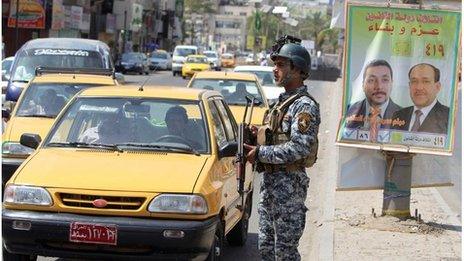Sectarian tensions stalk Iraq elections
- Published

The provincial elections being held in Iraq come at a time of severe political and sectarian tension and will be a test for Prime Minister Nouri al-Maliki ahead of the parliamentary elections due next year.
More than 8,000 candidates are competing for 378 seats in provincial councils - but the campaigns have been marred by violence.
Fourteen contenders, most of them Sunnis, have been assassinated. In the past week, dozens of people have been killed in a series of bombings across Iraq, targeting mainly Shia areas but also two polling stations.
Al-Qaeda's Islamic State of Iraq, a Sunni extremist organisation, usually claims responsibility for such attacks.
When I met Saleh al-Mutlag, the Sunni deputy prime minister, he was in shock. The first candidate of his party in the mixed province of Diyala had been assassinated. "It's a very high price that we are paying for democracy. Iraq is losing its best people," he said.
Mr Mutlag has lost six candidates in this campaign. When I asked who was behind the killing, he accused not only radical Islamists like al-Qaeda and the banned Baath party of Saddam Hussein, but also mainstream parties.
Most of the parties, which have armed militias, are involved in violence one way or another.
The government postponed the election in two Sunni provinces due to lack of security. This was a controversial decision.
Locals in those two provinces wanted to vote and claim fear among the government that it would lose, rather than security concerns, lie behind the decision.
On his recent visit to Iraq, US Secretary of State John Kerry called for Iraq to hold the vote simultaneously as it had under violent circumstances before. But his call fell on deaf ears. US influence on Iraqi politicians has apparently decreased since the withdrawal of American troops.
There will be no elections in the three provinces of the autonomous region of Kurdistan in the north. The region runs its own elections separately at different times.
For the second consecutive term there will be no elections in the oil-rich province of Kirkuk. Leaders of the Kurd, Arab and Turkmen communities in the province failed to agree the terms on which the poll should be held.
Shia rivals
For months, thousands of Sunnis have been protesting after weekly Friday prayers.
They accuse the Shia-led government of discriminating against them. The Sunni minority had the most to lose after the fall of Saddam Hussein's Sunni-dominated regime.
Mr Maliki's supporters reject the accusation of sectarianism. One of his candidates told me that their aim was to keep Iraq unified and protect its people, no matter what their sect or ethnicity.
The prime minister's dispute with the Sunni protesters is vital at this moment of Iraq's history, but his real battleground is within his Shia community.
He is facing rivals like the followers of Moqtada al-Sadr, who is reintroducing himself as a moderate.
He surprised many of his supporters when he announced his support for the demands of the Sunni protesters.
One of his senior aides told me that this election should not be about the Shia-Sunni divide but providing services to people.
Sadrists control only one province, Maysan, which was under British administration after the 2003 US-led invasion.
The governor, Ali Dawai Lazem, became a Facebook sensation with pictures showing him working in the streets supervising projects and even collecting garbage.
Now his party wants to capitalise on his success.
Dhiaa al-Assadi, the leader of the political groups of the followers of Mr Sadr, told me that he was comfortable with their campaign.
"Almost in every province Prime Minister Maliki visited we gathered more people in our rallies than his," he said.
But Mr Assadi he accepted that that was not the only indication of voting intention.
Mr Maliki has more support within middle-class Shia, who tend to seek stability and are generally less enthusiastic about taking part in rallies.
Old loyalties
In 2009, Mr Maliki won a landslide in the provincial elections in Shia southern Iraq and in the religiously mixed capital, Baghdad.
As a result his party controlled the local government in most of the provinces.
Over the past four years, public services have not improved significantly. Access to basic services like healthcare and clean water remains a challenge for many Iraqis, according to the International Committee of the Red Cross.
But that might not be a deciding factor when voters cast their ballot.
Worried more about the security situation and the sectarian rift, most Iraqis are likely to vote as they have done since 2003, across sectarian lines.
- Published18 April 2013
- Published13 September 2023
- Published14 March 2013